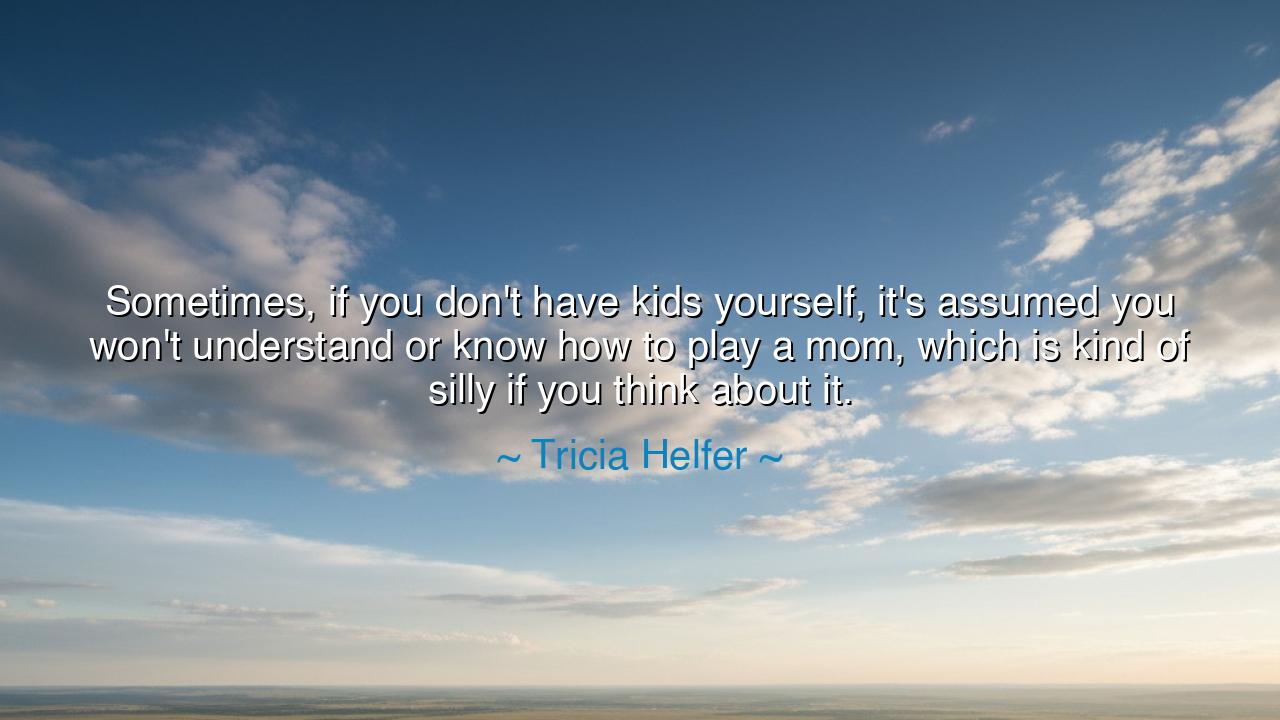
Sometimes, if you don't have kids yourself, it's assumed you
Sometimes, if you don't have kids yourself, it's assumed you won't understand or know how to play a mom, which is kind of silly if you think about it.






When Tricia Helfer said, “Sometimes, if you don't have kids yourself, it's assumed you won't understand or know how to play a mom, which is kind of silly if you think about it,” she spoke not just as an actress defending her craft, but as a philosopher defending the power of empathy — the human ability to understand and embody lives beyond our own. In her words lies a challenge to narrow judgment and a tribute to the imagination that binds us all. For what she speaks of acting also speaks to living: that understanding is not confined by personal experience, but awakened by compassion, observation, and heart.
In the days of the ancients, the poets and teachers understood this truth well. They knew that to truly see another’s life, one need not live it, but feel it. The dramatists of Greece — Aeschylus, Sophocles, Euripides — gave voice to queens and peasants, to mothers and kings, not because they shared each fate, but because they shared the essence of humanity. Helfer’s reflection, though born in the modern world, carries this same timeless wisdom. She reminds us that empathy is the bridge between souls, that art and understanding flow not from biology, but from the spirit’s ability to imagine love, loss, and the infinite shades of human emotion.
The origin of Helfer’s quote lies in her experience as a performer — a woman who, though not a mother herself, has played one on screen. Her words address a quiet prejudice that exists not only in acting but in all of life: the belief that one must live every story to tell it truly. But such thinking forgets the vastness of human capacity. The heart, after all, is a vessel that can hold the pain of another as if it were its own. The actor, the writer, the teacher — all are vessels of this sacred empathy. Through observation, through imagination, through compassion, they channel the experiences of others and give them voice.
In this way, Helfer’s words echo the legacy of Meryl Streep, often praised for her uncanny ability to inhabit roles utterly unlike her own — from a Polish Holocaust survivor to a fierce fashion editor. Streep once said that acting is “about understanding what makes people tick,” not about living identical lives. And what is true for the actor is true for all of us: to love, to guide, to nurture, to lead — one need not have walked every path, only to have looked at the world with curiosity and humility. The essence of being human lies in the ability to imagine another’s joy and suffering as if it were our own.
There is also in Helfer’s words a deeper message about judgment and worth. Society too often measures understanding by experience, forgetting that wisdom grows not only from doing, but from perceiving. A person who has never borne a child can still embody the nurturing spirit of a mother; one who has never been wounded in war can still understand courage. For empathy is the mother of connection — and imagination, its faithful servant. Helfer calls us to remember that we are not imprisoned by the limits of our own lives, but expanded by the lives we dare to understand.
In the ancient tales, this truth shines again and again. Consider Antigone, who defies the laws of men to bury her brother — her love transcends experience and law alike, revealing the universal heart of devotion. Or think of Queen Hatshepsut, who ruled Egypt as both king and queen, embodying roles that tradition said she could not play. Each reminds us that the human soul is not limited by circumstance or title, but by imagination. So, too, Helfer’s statement rises beyond acting to speak to the essence of humanity: that every person, regardless of their station, can understand, create, and express what lies outside their direct experience — if they listen deeply enough.
Thus, dear listener, the lesson is clear: do not confine understanding to experience, nor compassion to familiarity. The ability to feel for another — to grasp their struggle, their joy, their longing — is the divine gift that makes us more than flesh and bone. In whatever role life casts you, whether on a stage or in the quiet theatre of daily living, remember that empathy is your greatest teacher. Look, listen, and imagine, and you will see the world not through one life, but through many.
So let these words of Tricia Helfer be remembered not as a defense of acting, but as a hymn to empathy. You may not have lived another’s story, yet you can still understand it. You may not have known a mother’s burden, yet you can still feel her love. For this is the power that shapes civilizations, softens hearts, and bridges the gulf between souls — the eternal gift of imagination and compassion, the true art of being human.






AAdministratorAdministrator
Welcome, honored guests. Please leave a comment, we will respond soon